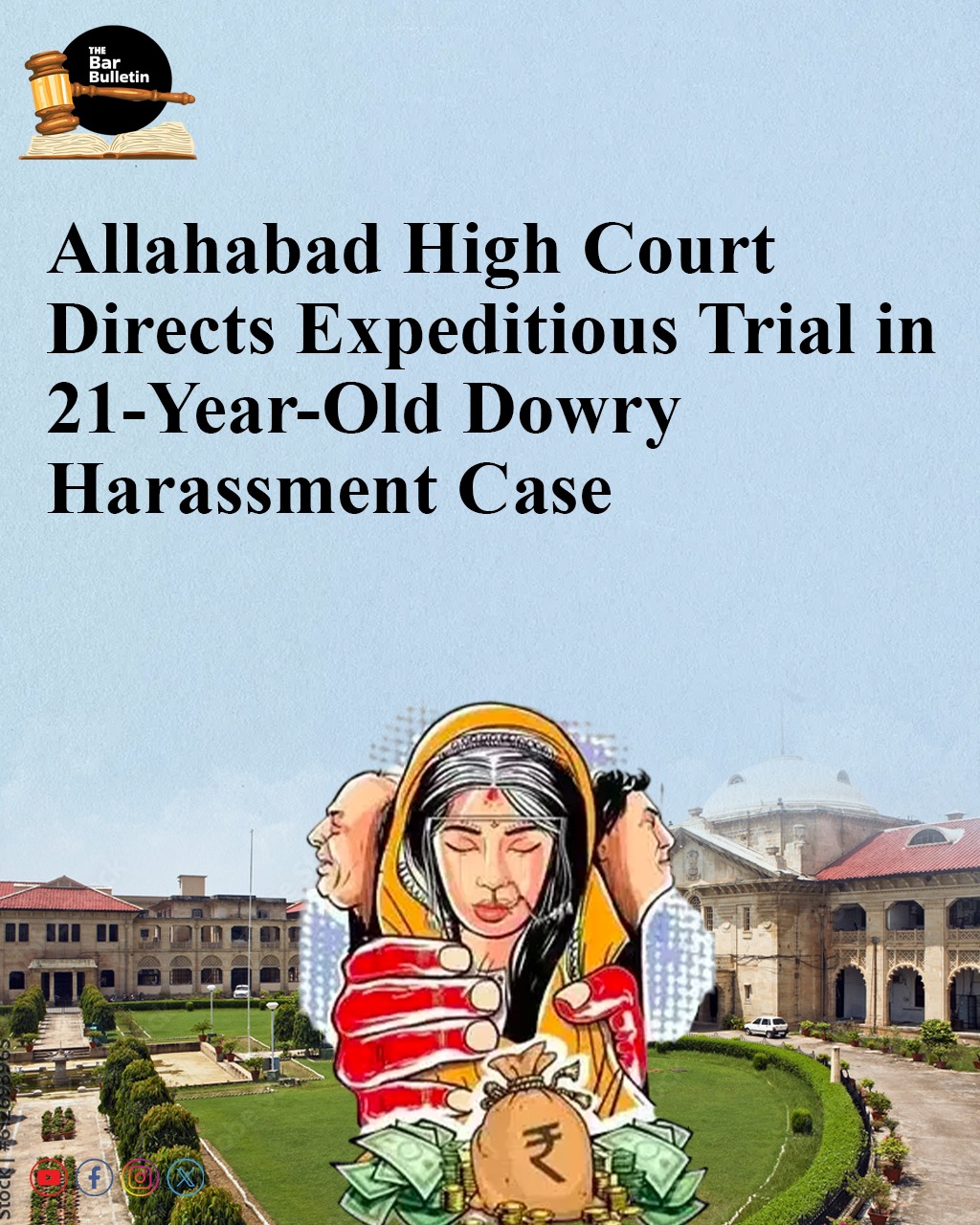The Allahabad High Court allowed a petition and directed the trial court to commence expeditious proceedings in a 21-year-old dowry harassment case. The court held that the prolonged and unexplained inaction by the trial court not only amounted to a denial of timely justice but also caused a serious erosion of the rule of law and violated the petitioner’s fundamental right to a fair and speedy trial. The court observed that the trial had not progressed an inch since the filing of the charge-sheet, and regretted that despite more than two decades passing since the FIR was registered, the trial court had failed to conduct any effective proceedings.
The petitioner contended that the accused(s) were influential persons who had been obstructing the fair and timely administration of justice on multiple fake and engineered grounds. The petitioner argued that for a period of 15 years, the proceedings could not take place due to the stay order granted by this Court and subsequently the trial court showed no interest in advancing the matter. The petitioner submitted that one of the accused(s), Shri Ramesh Agarwal (since died), was Peshkar of the District Judge, Moradabad, and had misused his official position by exerting undue influence to obstruct the fair and impartial conduct of proceedings before the trial court. The petitioner further alleged that there arose a reasonable apprehension that the accused(s) might exert influence over the proceedings of the Court, thereby posing a potential risk to the integrity and impartiality of the judicial process.
The case involved dowry harassment where the petitioner’s marriage to Respondent No. 7 was solemnized on 15.01.2003, in accordance with Hindu rites and rituals. The petitioner alleged that she was subjected to continuous harassment, physical abuses, and mental cruelty by her husband and other family members, all in connection with demands for additional dowry. Consequently, the petitioner-wife was forcibly thrown out from her matrimonial home on 08.08.2004, leaving behind her 7-month-old daughter and the son was retained by the husband, following which the FIR was filed under under Sections 498A, 504,506, 323 IPC, read with Section 3/4 of the Dowry Prohibition Act, registered at P.S. Nauchandi, District Meerut, which was subsequently transferred to Moradabad.The case witnessed multiple stays and delays, with proceedings being stayed from 2005 to 2010.
The court observed that upon perusal of the order dated 31.05.2005 and other orders, it was evident that the petitioner-wife was not afforded an opportunity of hearing on any occasion when this Court had granted interim stay of the arrest of accused(s) or had stayed the trial court proceedings. The court noted that despite both petitions being listed before this Court since 2004, no effective proceeding had taken place till the petition was dismissed for want of prosecution because of non-appearance of the accused(s). The court emphasized that one of the cardinal principles of criminal jurisprudence was the right to a free, fair, and expeditious trial. When this right was not upheld, litigants inevitably lost faith in the judicial process. The court further observed that if the trial court continued to grant exemptions to the witnesses without justifiable reason, and failed to compel their attendance, the integrity of the trial process itself might be compromised.
Justice Vinod Diwakar directed the accused persons in both the cases referred to in the prayer clause to appear before the learned trial court on the next date fixed, and thereafter on all successive dates. The court ordered that, in the event of their failure to appear without sufficient and justifiable cause, the trial court should record detailed reasons while considering any application for personal exemption. It was further directed that the learned trial court proceed with the trial on a day-to-day basis and/or weekly basis, by recording reasons, without granting any unnecessary adjournments to either party, and mandated that the trial be concluded expeditiously, keeping in view the prolonged pendency of the case for the past 21 years and the fact that it had not yet reached even the stage of framing of charge.
As one of the co-accused had served as Peshkar to the learned District Judge, Moradabad, for a considerable period, and his two sons were working as Peshkars in the same District Court, with another son of one of the accused being a practicing advocate in the District Court, Moradabad, the court held that the trial was to be conducted in-camera to ensure an unbiased and fair proceeding. The court said the directions were case-specific and not precedent, but stressed the State’s duty to ensure speedy justice and accordingly the petition was allowed.
Appearances
Petitioner: Dr. Sudha Garg (In Person)
Respondents: G.A., Krishna Dutt Tiwari



